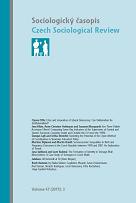Crisis and Innovation of Liberal Democracy: Can Deliberation Be Institutionalised?
Crisis and Innovation of Liberal Democracy: Can Deliberation Be Institutionalised?
Author(s): Claus OffeSubject(s): Social Sciences
Published by: AV ČR - Akademie věd České republiky - Sociologický ústav
Keywords: theory of democracy; liberal democracy; deliberative politics; crisis of democracy; institutional design
Summary/Abstract: The paper explores the possible contributions of deliberative procedures of political will formation to solving the problems encountered by liberal democracies today. To begin with, four functions of liberal democracy are distinguished: securing international peace, guaranteeing legal as well as political peace domestically, and producing good active citizens. The following part of the argument distinguishes four structural features characteristic of democratic regimes: stateness, rule of law, political competition, and accountability of the rulers. Thirdly, a brief summary of critical accounts concerning democracy’s actual failures and symptoms of malfunctioning is presented. In the final section, two families of institutional innovations that are currently being proposed as remedies for the observed deficiencies of democracy are explored: those leading to a better aggregation of given preferences of the citizens and those aimed at improving the process of preference formation itself. It is the latter, which constitutes the fi eld of deliberative politics that is investigated at some length. Beneficial effects of deliberative procedures and essential features of deliberative structures are discussed with reference to latest developments in the theory and empirical research on deliberative democracy.
Journal: Sociologický časopis / Czech Sociological Review
- Issue Year: 47/2011
- Issue No: 03
- Page Range: 447-472
- Page Count: 26
- Language: English

